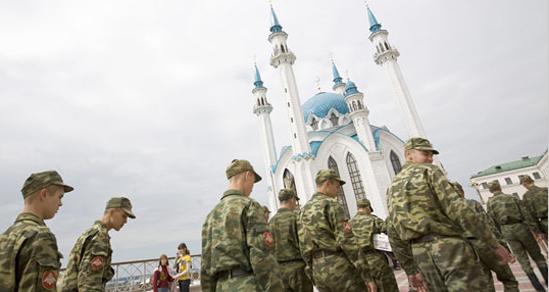
Heck, even I saw this.
Tatarstan is a long way from South Ossetia. Where South Ossetia is a poor border region of Georgia battered by war, Tatarstan is an economic powerhouse in the heart of Russia, boasting both oil reserves and the political stability that is catnip to investors.Ivan needs to think that there are 2nd and 3rd order effects out there.
But the two places have one thing in common: Since the collapse of the Soviet Union, both have given rise to separatist movements. And when President Dmitri Medvedev of Russia formally recognized the breakaway areas of South Ossetia and Abkhazia as independent nations two weeks ago, activists in Kazan, the Tatar capital, took notice.
An association of nationalist groups, the All-Tatar Civic Center, swiftly published an appeal that "for the first time in recent history, Russia has recognized the state independence of its own citizens" and expressed the devout wish that Tatarstan would be next.
The declaration was far-fetched, its authors knew: One of Vladimir Putin's signal achievements as Medvedev's predecessor was to suppress separatism. The Tatar movement was at its lowest ebb in 20 years.
Demographics, of course, are king here. The future belongs to those who show up - or culls the neighbors growing herd.
"In the long term, they could have signed their own death warrant," said Lawrence Scott Sheets, the Caucasus program director for the International Crisis Group, an independent organization that tries to prevent and resolve global conflicts. "It's an abstraction now, but 20 years down the road, it won't be such an abstraction."History. Tough thing, isn't it Francis?
...
Tatarstan was a case in point. Tatars still commemorate the day in 1552 when Kazan fell to Ivan the Terrible, absorbing their country into Holy Russia.
When Yeltsin encouraged regions to assume sovereignty, Tatarstan complied with gusto, adopting its own taxes and license plates.
Gleaming new mosques competed with Kazan's onion domes, and ethnic Tatars, who made up 48 percent of the population to the Russians' 43 percent, opened their own schools. The Tatar parliament declared that local conscripts could not fight outside the Volga region.
When Putin eliminated regional elections, the Tatar president, Mintimer Shaimiyev, protested vociferously, calling the plan a "forced and painful measure." But in the years that followed, Akhmetov, the editor of the opposition newspaper in Kazan, saw prospects for autonomy drop to a new low.
"We understood that our president could be removed at any time, within 24 hours," Akhmetov said. But Medvedev's decision to recognize South Ossetia and Abkhazia, he said, "created a precedent, kind of a guideline" for gaining independence. Moscow is confident that it wields strict control over politics in the outlying regions, he said, but that could change in 10 or 20 years.
A similar stirring came out of Bashkortostan, a major petrochemical center where ethnic Bashkirs make up about 30 percent of the population. A small organization called Kuk Bure, which has pushed for the Bashkir language to be required in public schools, issued a manifesto accusing Moscow of "double standards" for championing ethnic groups like the Abkhaz and Ossetians while ignoring their platform.
If you are still scratching your head, I will say again; you are lost if you have not read The Great Game









No comments:
Post a Comment